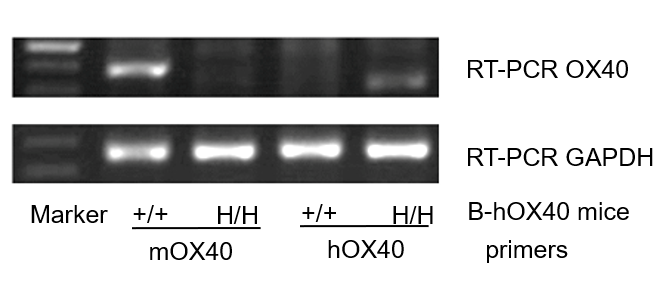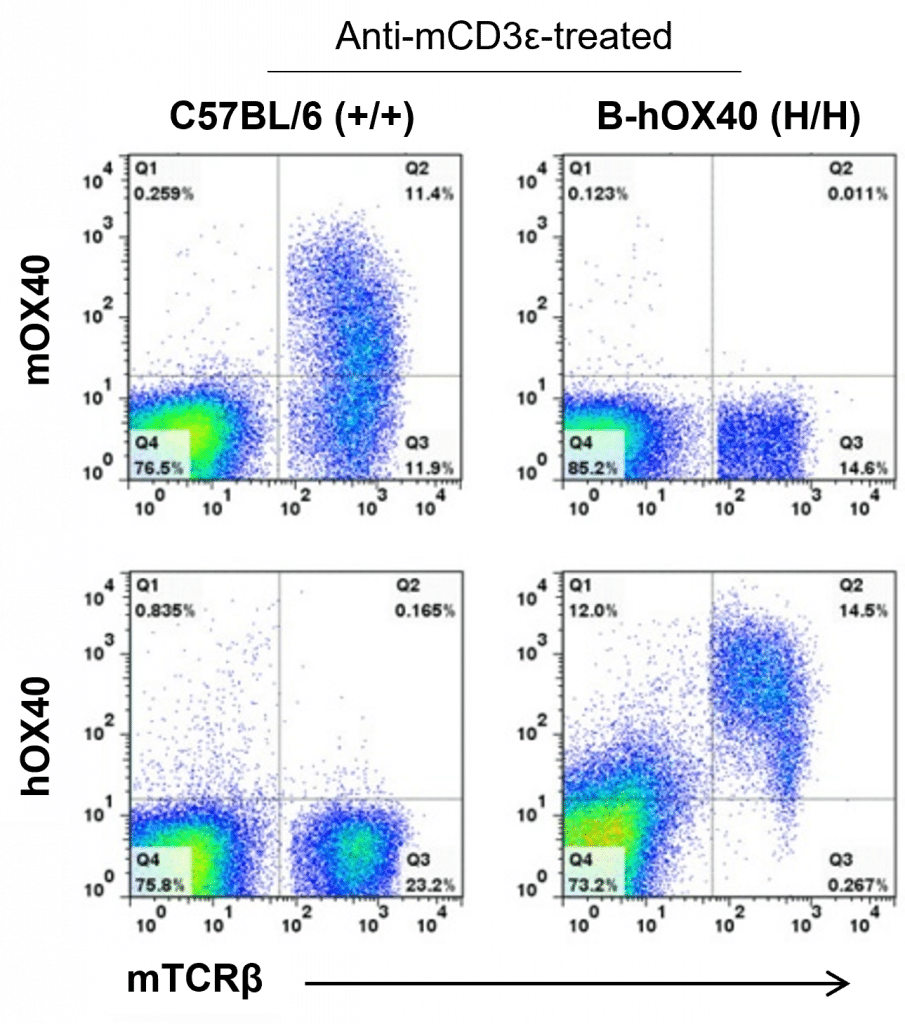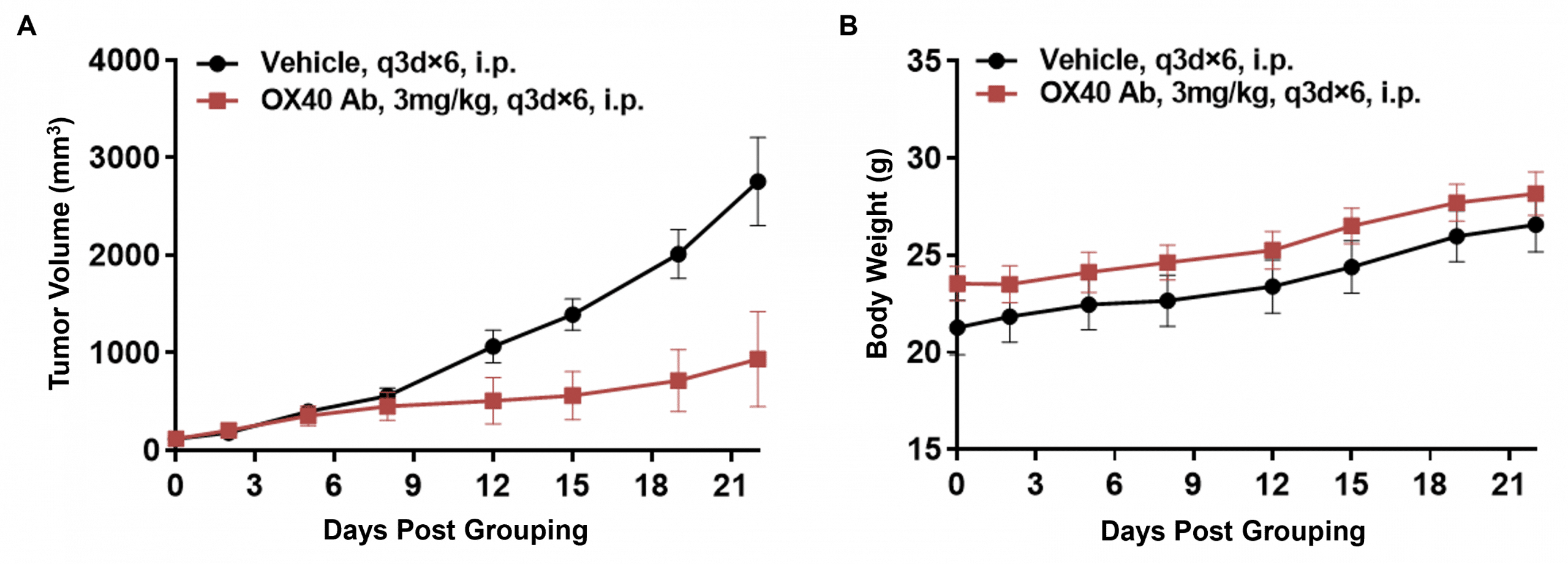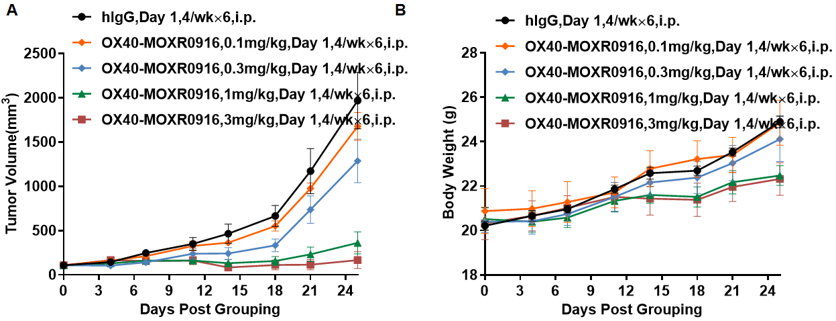Basic Information
-
Targeting strategy

-

Gene targeting strategy for B-hOX40 mice. The exons 1-5 of mouse Tnfrsf4 gene that encode the extracellular domain were replaced by human TTNFRSF4 exons 1-5 in B-hOX40 mice.
-
mRNA expression analysis

-

Species-specific OX40 gene expression analysis in wild-type and humanized B-hOX40 mice by RT-PCR. Murine Ox40 mRNA was detected in splenocytes isolated from wild-type (+/+) mice, while human OX40 mRNA was exclusively detected in homozygous B-hOX40 (H/H) mice.
-
Protein expression analysis

-

Species-specific OX40 protein expression analysis in humanized B-hOX40 mice. Splenocytes were isolated from wild-type C57BL/6 (+/+) and homozygous B-hOX40 (H/H) mice and analyzed by flow cytometry using species-specific anti-OX40 antibodies. Murine OX40 protein was detected in wild-type mice, while human OX40 protein was exclusively detected in B-hOX40 mice.
-
In vivo efficacy evaluation of anti-human OX40 antibodies

-

Antitumor activity of an anti-human OX40 antibody in humanized B-hOX40 mice. Murine colon cancer MC38 cells (5ⅹ105) were subcutaneously implanted into homozygous B-hOX40 mice (male, 4-6 week-old, n=5). Mice were grouped when tumor volume reached approximately 100 mm3, at which time they were treated with an anti-human OX40 antibody at schedules indicated. (A) The anti-human OX40 antibody inhibited MC38 tumor growth in B-hOX40 mice, (B) without negatively impacting body weight changes. This data demonstrates that B-hOX40 mice are a powerful preclinical model for in vivo evaluation of anti-human OX40 antibodies. Values are expressed as mean ± SEM.

Antitumor activity of an anti-human OX40 antibody (MOXR0916, in house) in humanized B-hOX40 mice. Murine colon cancer MC38 cells (5ⅹ105) were subcutaneously implanted into homozygous B-hOX40 mice (female, 4-6 week-old, n=6). Mice were grouped when tumor volume reached approximately 150±50 mm3, at which time they were treated with different doses of MOXR0916 at schedules indicated. (A) High dose of MOXR0916 inhibited MC38 tumor growth in B-hOX40 mice, (B) without negatively impacting body weight changes. This data demonstrates that B-hOX40 mice are a powerful preclinical model for in vivo evaluation of anti-human OX40 antibodies. Values are expressed as mean ± SEM.
-
References

-
1. J Immunol. 2013 Oct 1;191(7):3641-50. doi:10.4049/jimmunol.1202752. Epub 2013 Sep 6.
2. Cancer Res. 2013 Dec 15;73(24):7189-7198.doi: 10.1158/0008-5472.CAN-12-4174. Epub 2013 Oct 31.
3. Clin Cancer Res. 2013 Mar 1;19(5):1044-53.doi: 10.1158/1078-0432.CCR-12-2065.
4. Annu Rev Immunol. 2010;28:57-78. doi: 10.1146/annurev-immunol-030409-101243.


